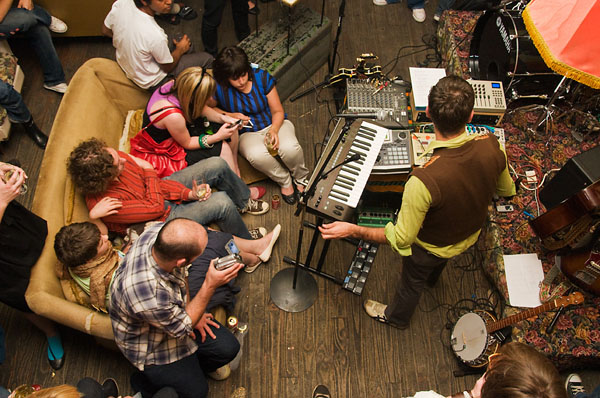 João Orecchia: Hands and Feet (Other Electricities, 11/10/09)
João Orecchia: Hands and Feet (Other Electricities, 11/10/09)
João Orecchia: “Sunshine Girl”
[audio:http://alarm-magazine.com/wp-content/uploads/2011/02/09-Sunshine-Girl.mp3|titles=João Orecchia: “Sunshine Girl”]Most musicians move to places to be surrounded by familiarity and comfort — cities with cheap rent, friendly clubs, and audiences with open ears. But when João Orecchia moved from Berlin, Germany to Johannesburg, South Africa in 2004, he did it for all of the challenges and adversity that he knew he would face.
As a white foreigner who creates skittery, experimental electro-acoustic sound collages, it could have been intimidating to face an audience that hugely consumes hip hop, techno, and the plethora of styles of South African folk music. He was leaving the embrace of Berlin, where experimental techniques have more traditionally been accepted.
“It was a major adjustment,” Orecchia says of the move. “At the same time, there’s something I love about the challenge of it. In Berlin, there’s a space for everything, and even the most off-the-wall shit is normal. Here, you have to work a bit harder.”
To be sure, working hard to find his own space wasn’t exactly something new to Orecchia. As an immigrant son of an Italian father and a Peruvian mother (the traditionally Portuguese first name is just a red herring), Orecchia grew up in Brooklyn amongst the noise of the multifaceted, multicultural melt of the punk, post-disco, hip hop, techno, and art rock that brewed there in the ’80s and early ’90s.

But one of Orecchia’s most poignant music-related memories of his youth was not of a stained-brick punk club or a sweaty nightclub, but of the Italian restaurants and cafés to which his father, a musician himself, brought him to hear the music of his homeland. “My father used to sing,” he says. “We’d go to these Italian restaurants in the far reaches of Brooklyn, and he’d get up there with the guy playing his keyboard. He was pretty good too!”
His father’s voice can be heard on two tracks on Orecchia’s album Hands and Feet, his first release available as a non-import in North America. Whereas Orecchia explored homelessness on his debut, Motherless Brooklyn, on this album, he tackles the more personal issue of his identity.
“My first sense of identity was that I was a Peruvian-Italian,” he explains. “Growing up in Brooklyn, speaking English at school, it started to change. Then I was in Berlin for around five years, and the question ‘where are you from?’ obviously came up all the time. ‘I’m from New York.’ ‘So you’re American?’”
This confusion was compounded by what he calls life changes, whether it was moving to another continent, turning 30, or experiencing the passing of his father a couple years ago.
“Some kind of imperfection or bad timing is the thing that inspires me most.”
The album is bookended by his father’s voice singing the pop standards “When I Fall in Love” and “Arrivederci Roma.” The vocal tracks themselves were culled from recordings that his father cut in Italy in the 1960s and contrast Orecchia’s off-kilter manner of scratchy blobs of musique concrète, humming synths, and tinkling toy instruments.
“He went to the US in his mid-20s wanting to be a singer,” Orecchia says of his father’s early years. “There were some strange straight-out-of-a-mafia-movie stories around that. He recorded those two songs straight to vinyl, hoping to get discovered. When he died, someone sent me a CD with the two songs and some old photos of him. First I thought, ‘Wouldn’t it be cool to do a modern kind of duet with him?’ That’s how ‘When I Fall in Love’ came about; then the other just seemed to fit so well as an ending, and it tied the whole idea together for me.”
Other tracks reveal Orecchia’s sense of mixing strange acoustic instruments with strange electric ones (a new favorite is a Namibian toy trumpet that plays pre-recorded beats), collaborations with artists such as South Africa’s Spoek Mathambo and Chicago rapper Serengeti, and maintenance of a pungent sense of melody.
The electronic waltz of “De Los Muertos” wouldn’t sound out of place if it appeared in a dusty Tim Burton flick, whereas songs such as “Midnight Serenade” and “Gold to Green” could have been culled from a video-game soundtrack.

The joy that many musicians, including Orecchia, find in accidents and mistakes is ever present; his songs are filled with random bursts of stuff that would sound out of place on any other record, like hissing or chimes or a little girl singing “Twinkle, Twinkle, Little Star,” but they weave organically here. “Some kind of imperfection or bad timing is the thing that inspires me most,” Orecchia says.
Often instrumental and dreamily frantic, the modern sound of his music makes it no surprise that Orecchia has found some work in television commercials; the average South African may have heard Orecchia’s music in one of a number of commercials for which he’s composed. These have been for companies that include Nedbank, Vodafone, Netflorist, and Beacon Chocolate.
The spot for the latter is a surreal, computer-animated tour of a fantasy factory where robotic cows and anthropomorphic bees create the eponymous chocolate, accompanied by the click-clack of Orecchia’s music-box-inspired soundtrack.
Besides commercials, he also has composed for theater productions and independent films, such as the 2004 German documentary Fremde Nachbarn (Foreign Neighbors) and the 2008 short film Fuzzy John. Perhaps his strangest gig yet was composing the war cries for a 2008 snowball-fighting tournament / visual-art experiment that was held in downtown Johannesburg.
“Basically, these crazy Swiss guys took the snowball fight to the level of a serious sport with teams and rules and everything,” he says. “It’s meant to be bizarre and a lot of fun, and I think the idea of bringing it to Africa amplified that quite a bit.”

